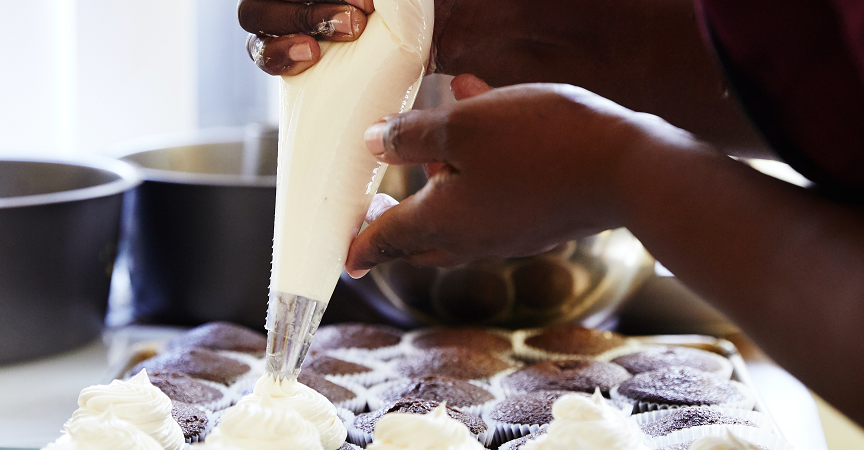Inclusive Kitchen: Tackling Systemic Racism – Q&A with Ellen Asiedu, BLACK FOODIE
One of RC Show 2021’s most important panels is ‘Inclusive Kitchen: Tackling Systemic Racism’.
As we take a step back to reflect on this year, we need to look at how we can tackle the systematic racism that is omnipresent in our kitchens and restaurants.
The upcoming panel, taking place on Tuesday, March 2, 2021 will highlight a number of foodservice leaders about the devastating effects of racism, so we can begin to understand how to break down these barriers and biases to create change and encourage inclusivity in your own kitchens and operations.
The panel will include the following speakers:
Eden Hagos, Founder, BLACK FOODIE
Philman George, Corporate Chef, High Liner Foods
Joseph Shawana, Chair of Indigenous Culinary of Associated Nations & Professor at Centennial College
Roger Mooking, Chef & Host on Food Network & Cooking Channel
Suzanne Barr, Chef, Social Advocate, Author, Suzanne Barr Food
We sat down with a few of the above panelists, as well as other key industry players to begin the conversation. We’ll be providing their full interviews throughout the month.
Here’s part one of this series, Q&A with BLACK FOODIE CEO Ellen Asiedu.

What’s the first action an employer should take to ensure that they are fostering an anti-racist work environment?
Believing that the problem exists and that they are operating within a system that is racist, to begin with. Then, they should commit to educating themselves on the ways that racism rears its head in the food industry and work with their HR and leadership teams to make small but effective changes in the workplace.
What type of non-performative actions can allies in the industry take?
Actively listen to Black people. Seek to understand and consider how you might be a part of the problem, consciously and unconsciously, and the ways you can be part of the solution.
Engage with, follow, and learn from leaders in the community who are talking about actionable ways that the hospitality industry needs to change in order to effect real change. Maybe that’s about amplifying Black voices, hiring Black influencers for campaigns, or recommending that the Black people and people of colour in your organization be put forward for promotions where their opinions will truly count.
I’d also strongly suggest that allies do as much research as they can on their own. Asking Black people, and especially Black women+, to take on the labour of explaining systemic racism to you for free is not the appropriate way to move forward when there are so many other avenues of research. If you do decide to hire a Black woman+ for consulting or strategy in this vein, make sure to pay them their rate.
Where does the food media need to place more energy/effort/give more attention?
The food media industry is still very homogenous from the top down, so those who have the power to change those structures should take the first steps to do so.
From a marketing perspective, that kind of systemic change starts with deliberately and purposefully looking at non-White audiences as part of a brand’s core target demographic. The time has passed for agencies, comms teams, and everyone in between to look at ethnic communities as auxiliary or supplementary audiences who they should only engage with as part of diversity and inclusion initiatives. That formula just won’t fly in 2021.
These unique groups are and have been, your target audience, for years — you just haven’t put the dollars and time behind learning and engaging with us. Fortunately, there’s an easy fix. Encourage your PR agencies to look beyond your usual White influencers and chefs to promote products and services. Collaborate with brands like BLACK FOODIE to create culturally-relevant content and do market research in diverse communities to learn how users from all walks of life are interacting with your products. There are millions of dollars to be made by listening to, featuring, and spotlighting diverse stories – don’t miss out because you’re afraid to do something different.
How can food be used as a form of resistance?
Food is political and it plays a role in the stories we tell about different cultures. When you actively choose to support local and minority-owned food businesses in your neighbourhood, you’re making a statement to yourself, your family members, and, if you post your experiences on social media, to the world. You’re affirming that these cultures are worthy of being discovered and enjoyed, and that these businesses are worthy of being patronized. That creates a positive impact with a solid ripple effect. Plus, not only does the money go farther, you’re building community with every purchase. Food is so universal and yet so powerful, and I hope that more people understand that this year.
Join us at RC Show 2021 ONLINE LIVE as we address this important issue during the Inclusive Kitchen: Tackling Systemic Racism panel taking place on Tuesday, March 2nd at 2:00 PM on the Speaker Stage.







